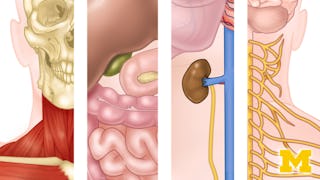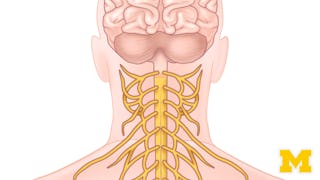Filter by
SubjectRequired
LanguageRequired
The language used throughout the course, in both instruction and assessments.
Learning ProductRequired
LevelRequired
DurationRequired
SkillsRequired
SubtitlesRequired
EducatorRequired
Explore the Nervous System Course Catalog
 Status: Preview
Status: PreviewThe University of Chicago
Skills you'll gain: Neurology, Physiology, Anatomy, Behavioral Health, Mental and Behavioral Health, Mental Health Diseases and Disorders, Vital Signs, Control Systems, Coordination, Biology, Communication Systems
 Status: Free Trial
Status: Free TrialUniversity of Michigan
Skills you'll gain: Human Musculoskeletal System, Anatomy, Endocrinology, Pulmonology, Cardiology, Respiration, Gynecology, Hematology, Obstetrics And Gynecology, Orthopedics, Neurology, Urology, Nephrology, Kinesiology, Physiology, Medical Imaging, Sports Medicine, Biology, Medical Terminology, Cell Biology
 Status: NewStatus: Preview
Status: NewStatus: PreviewSkills you'll gain: Music, World Music, Culture, Psychology, Neurology, Anatomy, Science and Research
 Status: Preview
Status: PreviewDuke University
Skills you'll gain: Neurology, Physiology, Anatomy, Cell Biology, Psychology, Pathology, Molecular Biology
 Status: Free Trial
Status: Free TrialUniversity of Michigan
Skills you'll gain: Anatomy, Neurology, Physiology, Medical Terminology
 Status: Preview
Status: PreviewDuke University
Skills you'll gain: Physiology, Respiration, Endocrinology, Anatomy, Pulmonology, Cardiology, Nephrology, Urology, Kinesiology, Vital Signs, Neurology, Biology, Nutrition and Diet
What brings you to Coursera today?
 Status: Free Trial
Status: Free TrialUniversity of Colorado Boulder
Skills you'll gain: Model Based Systems Engineering, Failure Analysis, Systems Engineering, Engineering Management, Requirements Management, Scope Management, Design Reviews, Project Scoping, Root Cause Analysis, Program Management, Requirements Analysis, Test Engineering, User Requirements Documents, Cost Management, Contract Management, Systems Design, Business Requirements, Systems Thinking, Project Risk Management, Risk Management
 Status: Free Trial
Status: Free TrialRice University
Skills you'll gain: Human Musculoskeletal System, Anatomy, Endocrinology, Orthopedics, Kinesiology, Physiology, Neurology, Medical Terminology, Cell Biology, Biology, Chemistry, Clinical Practices, Sports Medicine, Physical Therapy, Molecular, Cellular, and Microbiology, Life Sciences, Lifelong Learning
 Status: Free Trial
Status: Free TrialSkills you'll gain: Medical Terminology, Pulmonology, Pathology, Endocrinology, Cardiology, Medical Records, Respiratory Therapy, Neurology, Obstetrics And Gynecology, General Medical Tests and Procedures, Diagnostic Tests, Urology, Gynecology, Anatomy, Human Musculoskeletal System, Health Information Management and Medical Records, Cell Biology, Orthopedics, Physiology, Immunology
 Status: Free Trial
Status: Free TrialUniversity of Colorado Boulder
Skills you'll gain: Kinesiology, Electrophysiology, Rehabilitation, Exercise Science, Human Musculoskeletal System, Sports Medicine, Exercise Therapy, Physical Therapy, Neurology, Physiology, Geriatrics, Control Systems, Coordination, Anatomy, Cell Biology, Biology
 Status: NewStatus: Free Trial
Status: NewStatus: Free TrialLecturio
Skills you'll gain: Health Disparities, Stress Management, Social Determinants Of Health, Psychology, Sociology, Behavioral Health, Human Development, Cultural Diversity, Human Learning, Mental Health, Socioeconomics, Neurology, Biology, Non-Verbal Communication, Physiology
 Status: New
Status: NewPearson
Skills you'll gain: Systems Architecture, Software Architecture, Systems Design, Solution Architecture, Service Oriented Architecture, Maintainability, Systems Analysis, Enterprise Architecture, Scalability, Requirements Analysis
Nervous System learners also search
In summary, here are 10 of our most popular nervous system courses
- Understanding the Brain: The Neurobiology of Everyday Life: The University of Chicago
- Anatomy: University of Michigan
- The Neuroscience of Music and Emotion: Berklee
- Medical Neuroscience: Duke University
- Anatomy: Human Neuroanatomy: University of Michigan
- Introductory Human Physiology: Duke University
- Introduction to Systems Engineering: University of Colorado Boulder
- Human Anatomy & Physiology I: Rice University
- Human Anatomy and Medical Terminology Fundamentals: MedCerts
- The Science of Movement: University of Colorado Boulder










